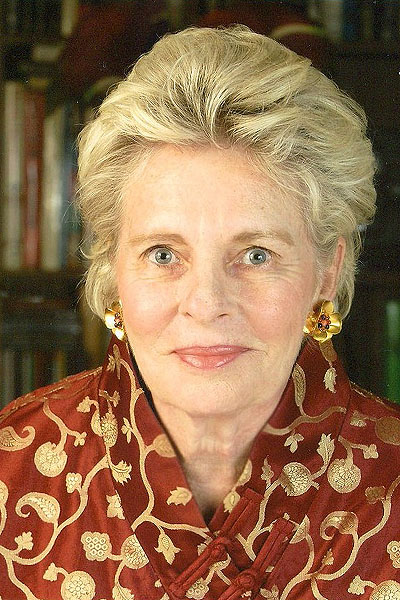
Nancy Nelson didn’t set out to be an author, but then she met Cary Grant and felt she had no choice but to tell his remarkable life story.
Those close to Mr. Grant knew that the famous actor who oozed style, elegance and charm had actually risen from quite humble beginnings and a traumatic childhood in the small English town of Bristol as Archibald Alexander Leach before reinventing himself as Cary Grant—one of the most beloved American movie stars of all time. According to Ms. Nelson, his inspirational story was one that needed be told.
Ms. Nelson—who is the owner of the Nelson Agency, a speaker’s management business that has represented clients such as Gregory Peck, Lucille Ball and Carol Burnett—first met Mr. Grant through Ginger Rogers back in 1981 when the famous dancer was making lecture appearances. Needing a publicity photo of Ms. Rogers for a brochure, Ms. Nelson asked her for an image.
Instead of providing the obvious—a picture taken with dancing partner Fred Astaire—Ms. Rogers met up with Ms. Nelson at a friend’s beach house in Southampton and provided her with a picture of herself with Mr. Grant, whom she had dated briefly years before, and with whom she had remained friendly.
The only problem Ms. Nelson had with the photo was that she’d need to get permission from the famously charming leading man. So she wrote to him.
Not only did Mr. Grant approve the picture, he struck up a friendship with Ms. Nelson, one that eventually, after months of telephone calls and written correspondence, led to him reluctantly agreeing to a speaking engagement of his own, “A Conversation with Cary Grant.”
That single “Conversation,” which took place in San Francisco on October 21, 1982, led to a series of speaking engagements for the man who was actually quite shy when not on-screen and nervous about speaking in public. Getting to know Mr. Grant as a real man, and not just as a legend, compelled Ms. Nelson, who lives part-time in Wainscott and Manhattan with her husband, Bertrand M. Lanchner, to write “Evenings with Cary Grant: Recollections in His Own Words and by Those Who Knew Him Best.” The book was first published in 1991 and reissued in 2003 and again in 2012.
“The thing that was so impressive about Cary Grant is that he was self-made,” Ms. Nelson said during a telephone interview last week. “He really had depth. He had so much curiosity about what was happening in the world. To the day he died, he was still learning. Cary wanted to know whatever there was to know about everything.”
“The whole idea of the reinvention, the pulling himself up by the bootstraps, being a poor boy in Bristol,” she continued, “at 16, he comes to New York to work in vaudeville. It’s the most amazing story. He saw the way people dressed, the way they behaved. He came from a Cockney background to America, to polo grounds and baseball games. He became Cary Grant. Nobody talked like him and nobody walked like him. He was just so graceful.”
Described as a “fan-preferred biography” by publisher Applause Theatre and Cinema Books, Ms. Nelson calls her homage to Mr. Grant, who died on November 29, 1986, as “a celebration of his life.” Mr. Grant’s widow, Barbara, and Jennifer, his daughter from his marriage to actress Dyan Cannon, agree. They both gave their blessings to Ms. Nelson’s efforts and allowed her access to Mr. Grant’s personal papers and closest friends.
In the forward, which Barbara and Jennifer wrote together, it states, “‘Evenings with Cary Grant,’ ... is written using his own recollections, those of his friends and loved ones, and with access to his personal papers ... We are delighted that Nancy Nelson has so accurately portrayed the husband and father that we love.”
The 400-plus page book is a comprehensive, loving account of Mr. Grant’s life. It includes reminiscences from hundreds of confidantes and loved ones such as Katharine Hepburn, Mr. Peck, Audrey Hepburn, Elizabeth Taylor, Sophia Loren, Quincy Jones, Dina Merrill and James Stewart, to name a few.
During her research, Ms. Nelson discovered that Mr. Grant spent quite a bit of time here on the East End as a frequent houseguest of Norman and Micky Zeiler in Westhampton. He had met Mr. Zeiler, who owned a clothing company, while shopping in Manhattan with Doris Day for clothes to wear in “That Touch of Mink.” They became close friends. It is believed that Ms. Zeiler taught Jennifer how to swim.
“He was the most charming houseguest,” Ms. Zeiler is quoted as saying in the book. “I can still see him in his watermelon colored pajamas.”
Another Westhampton-area local, Bobby Altman, recalled his time with Mr. Grant to Ms. Nelson.
“Cary and I spent a lot of time together during those weekends,” he said. “He never liked to wear shoes. He’s always show up barefoot for lunch or at night when we went to eat at Casa Basso.”
Ms. Nelson said that she had asked Mr. Grant, who was intensely private about his personal life, about writing a biography while he was still alive. His response was, “only if we’re standing in a bread line.”
“What people who didn’t know him might not know was how modest and humble he was,” Ms. Nelson said. “It wasn’t about fame and it wasn’t about money. It was about seeking the love of his mother.”
Last week, she mused on what Mr. Grant would say about the book she had written.
“Everybody thinks he would really like it because he was, after all, only human,” she said. “Too bad people can’t hear what people say about them when they die.”